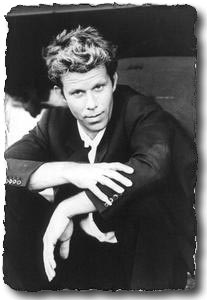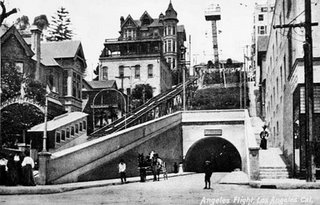These two Believer pieces have been up for a little while, but they're worth the link. Paul Collins, author of The Trouble with Tom: The Strange Afterlife and Times of Thomas Paine, gives credit for the creation of modern crime to a nineteenth-century journalist.
Curtis was the original shoe-leather reporter, with an encyclopedic intimacy with the streets of London and its denizens that came from an absolute horror of any form of locomotion save walking; he utterly refused to use a horse or coach. Once up from his armchair in his rumpled clothes, he invariably set out from his apartment to walk upward of eight miles in the predawn hours, starting out near his house at Farringdon Market, and making a peculiarly coiled loop—often retracing his steps several times over—through the vegetable sellers at Covent Garden Market, down through Hungerford Market, and milling with the famously foul-mouthed fishmongers at Billingsgate as they laid out Thames oysters, Scottish salmon, and Norwegian lobsters upon the stroke of their market’s 5 a.m. opening.
By the time he reached the opening of the Old Bailey, the sun was up and he was ready to write. The other reporters were only just now rubbing the sleep out of their eyes and stumbling in; none could hope to compete with Curtis, and they didn’t really try. Curtis alone recorded every trial, regardless of whether it had any news interest, quite simply because he liked to keep his own record of the court. Such a monumental task would have crippled the hand of any other journalist. But Curtis was known to have a fearsome ability at shorthand—he was so fast, in fact, that he published his own guide, titled Shorthand Made Shorter.
Curtis covered the conviction of a brutal killer, whose trial was seemingly as gruesome as his crime. The victim was a woman responding to an ad for matrimony, and The Believer also supplies samples of these responses.
[Sir,] On taking up the paper this morning, your advertisement was the first thing that met my eye, and in seeing the word ‘Matrimony,’ I laughing said, a gentleman wants a wife, but I suppose he is in still greater want of money, otherwise he wishes to make himself warm this cold weather, by laughing at the credulity of the female sex… Having said all I have to say, I fetched a deep sigh, conscious, I suppose, of my own defects, and again looked at the paper without intending to do it. I read your advertisement through, and was not a little surprised upon finishing it; for, although there may not be one word of truth in it, it certainly wears the semblance of sincerity…. I repeat, if your tale is true, upon my word I pity you: if it is a fiction, I hope my sex may be revenged by your being obliged, at some future period, to pass a month, one month, in a house of discord….
*
Sir,
I beg to answer your advertisement of last Sunday, but really think it nothing but a frolic; I know a charming young woman of no property, her friends highly respectable, nineteen years of age, exceedingly agreeable person, has had the charge of her parent’s house these three years, and brought up by a truly amiable and virtuous mother. I can with great truth say the young lady is not aware of my answering your advertisement. If you think proper, you may address a line to Mrs. ‒—. I hope you will act honorably with regard to the name, as the writer is a married woman. A friend will put this in the twopenny post.
Your obedient servant,
[signed]
[P.S.] The young lady has never been attached to anyone, nor has she ever left her friends.















